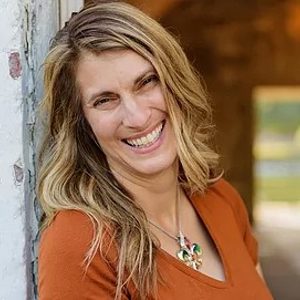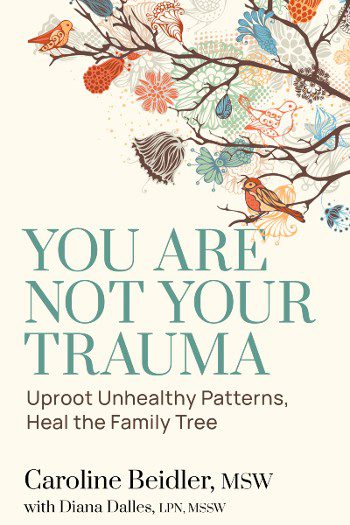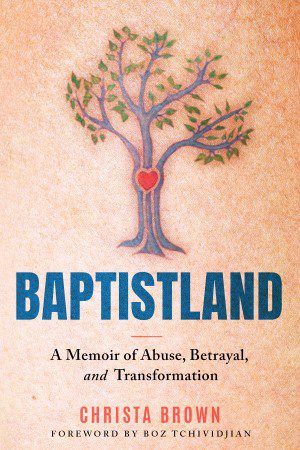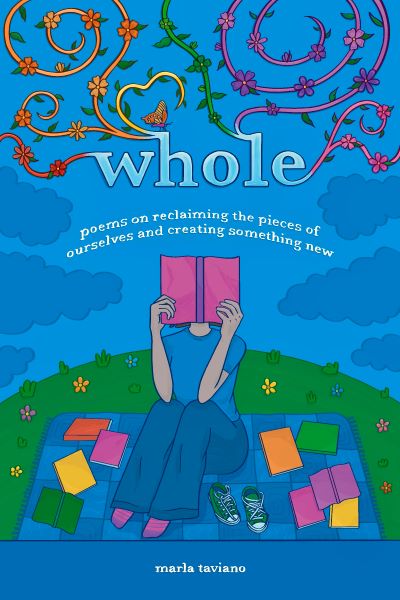The following is adapted from Intersexion: A Story of Faith, Identity, and Authenticity by Cynthia Vacca Davis, which is an account of her friendship with and the life experience of her friend who is intersex.
I slid into the high-backed vinyl chair across from Mitchell’s desk, grateful to be wearing black. The dark fabric masked the stickiness—part nervous perspiration, part fortitude—that was seeping from my pores. Arguably my entire life had been moving toward this moment. A tenure-track position had fallen, mid-semester, in my lap, and I was about to throw it all away.
“Before we go up to the boardroom,” Mitchell said, steepling his hands as he leaned back in his chair, “are there any other questions you have about the position?” I’m sure Mitchell was expecting something light, perhaps the day’s agenda for my full-campus interview or details about my responsibilities. But I’d already asked those questions.
I took a deep breath. “Thanks for sending along the faculty handbook last week. I was particularly interested in the section on intellectual freedom and publishing.” I paused in an effort to avoid regrettable phrasing—or fainting, neither of which was out of the question.
“The section interested me in light of a manuscript I am working on about intersex and transgender people.” I paused, considering the possibility that enough had already been said, before adding, “in the church.”
Mitchell went blank, as though disabled by an invisible switch. Seconds ticked by before he rallied. “Why,” he asked, “would you ever be interested in writing about that?”
Because transgender teens are disproportionately homeless? Because nearly half of transgender adults attempt suicide at some point in their lives? Because the church is the one institution to which these statistics should matter most? Although any one of those reasons should have been sufficient, I went for the personal narrative.
“I have a friend who appeared female at birth but inside, always knew he was male. In puberty, he even developed male sex organs. But he lived his entire life until now as a woman, because he was afraid the church wouldn’t accept him for who he was.”
“So you’re just telling this person’s story?” Mitchell asked, a hint of hopefulness in his voice. I imagined Mitchell’s brain already working to reframe the situation into something palatable.
“I’m not yet sure of the full extent of my project,” I answered honestly.
Mitchell nodded and glanced at his watch. “I think it’s best that we just continue this discussion upstairs,” he said. “We’ll have to see what Peters thinks.”
I’d never actually met President Peters, although, from scant forays into his social media postings and stories, I couldn’t picture him enthusiastically endorsing anything that could be construed as progressive. But I had already confessed that I considered myself “socially liberal” and supported pro-gay legislation during a prior conversation, and I was still in the game.
I followed Mitchell up a staircase and through a maze of hallways; we kept walking ever deeper into the upper floor of the building until he stopped at a room that boasted the largest table I have ever seen.
“The others will be joining us in a moment,” Mitchell said. “I’m expecting Peters, Jim, Catherine, and Kent.”
Peters entered the room with a clipboard and a crisp, businesslike air. He was accompanied by Catherine, the head of payroll and IT, and Kent, a psychology professor who had been to my home for dinner about a year prior, when my son and his daughter briefly dated. Jim introduced himself as the vice president and provost.
After a few pleasantries, Mitchell cleared his throat. “Cynthia and I were talking earlier about our intellectual freedom policy. She wanted to clarify it in light of a manuscript she’s working on,” he said. “Why don’t you tell the group what you shared with me down in my office?”
I swallowed hard. “Well, I am working on a project about intersex and transgender people. In the church.”
The room was still. Faces froze. The polished table was the only thing in the room still beaming.
“Why this topic?” Peters boomed, laughing.
I took a deep breath. “Maybe you’ve heard the term hermaphrodite,” I said. “It’s actually outdated and misleading, but when people use it, they typically mean intersex: someone who has both male and female organs. That describes my friend Danny.” I explained what I’d explained to Mitchell downstairs and added, “It’s become too much for him physically and psychologically to continue living as someone he’s not, so he’s made the choice to live the rest of his life outwardly being who he has always been inside.”
“Whoo hoo hoo,” Peters chortled, bringing a fist down to the table and then his head right beside it. I wasn’t sure if this outburst was good or bad. “Well, how often does something like this actually happen?” he asked, gathering his composure.
“About one in two thousand people are like my friend Danny. But studies show that approximately one in one hundred people are born with bodies that differ in some way from standard male and female binaries,” I said, drawing on information I’d gathered from the website of the Intersex Society of North America. “The truth is, you all know someone who is like this, but they are afraid to tell you.”
Peters waved a palm idly at the ceiling. “It sounds like that L … G …B … T … Q nonsense.” He recited the letters slowly, as though picking them out of a particularly thick alphabet soup.
“Where are you going for this MFA anyway?”
“Old Dominion.”
“I’ll bet they lo-o-o-v-e that!” Peters snorted. “Secular, liberal education. Do you support homosexuality?”
“Intersex actually doesn’t have anything to do with being gay,” I said. “And transgender refers to a person’s psychological identity, whereas intersex refers to biological characteristics. Where those lines may converge isn’t really known,” I added.
“Well,” Peters said, “it may not be gay, but they’re certainly kissing cousins!” he blurted, then burst into gales of red-faced laughter when he realized what he said. The rest of the room broke down, too.
I wasn’t sure what, exactly, was so funny. Personally, I found Peter’s reaction to be absurd enough to warrant laughter, but it wasn’t clear what amused him. Was it nervous tension?
Peters sobered. “But you understand what I am asking here,” he said, looking directly at me. “Is homosexuality wrong?”
I deflected to buy time. “It’s wrong for me,” I said.
“Don’t play that game with me,” Peters boomed. “Don’t make me ask you the right question, in exactly the right words. That’s the thing my sons always did that made me the maddest.” His face flushed and his nostrils flared.
In an instant, I’d gone from being a professional woman on the cusp of landing a promotion to an insubordinate child in need of correction.
“You know,” Mitchell intervened, “Cynthia probably hasn’t had the opportunity yet to see the new Marriage and Family Statement.”
Peters took a breath and smiled. “Ah, okay. Will you shoot that on over to her, Mitchell?” He tapped a pen on his clipboard, then looked me straight in the eye. “Why should I hire you?”
It was the easiest question they’d asked all day. “Because I don’t know how long you’re going to have to look before you find someone who cares more about the students than I do.”
Peters’s eyes betrayed his surprise at my bold statement, but then he smiled and nodded. “My first impression is that you’d be dynamite here. I may have some follow-up questions for you later. And Mitchell—get our Marriage and Family Statement over to her right away.”
The prospect of the statement loomed over the otherwise encouraging second round of meetings. I knew everything—the smiles, handshakes, and attractive financial package presented to me at the business office—would all vaporize as soon as I opened my email.
When I got home that evening, I parked in front of my house, grabbed my laptop, and ran to the living room, fingers flying across the keyboard as I entered various passcodes to access my campus email. I took a deep breath and opened the one from Mitchell with “Marriage and Family Statement” in the subject header.
The statement consisted of a thorough catalog of variant human conditions, to include not only all homosexuality but also “attempt(s) to change one’s biological sex, or otherwise acting upon any disagreement with one’s biological sex,” followed by a hard-and-fast ruling that the entire list of ills was “sinful and offensive to God” and “repugnant to the principles of the University.”
It took about a second of scanning the document for the truth to sink in. I was never going to be a tenure-track professor. Not now, not at this school, and likely, not ever. I stared blankly at the screen, willing the letters to rearrange themselves into words that were more gentle, loving, inclusive.
“What does it say?” my husband asked.
“That this is over,” I answered.
Until this moment, I’d been sitting at a commitment equinox. I listened to Danny and cheered him on as he began the process of becoming more himself each day. I helped him practice conversations that would change the course of his life, waving from the sidelines as he embarked on the journey of a lifetime—his lifetime. Balanced at the midpoint between spectator and participant, I had, now, the luxury of watching, albeit with concern, how things turned out for the principal players.
But now it was my future on the line. As humans in polite society, we know when it’s socially acceptable to avoid certain topics. Politics, finances, a secret penchant for blaring Nickelback alone in the car—we all pick and choose what to reveal in various settings. I could retreat into vague statements of pseudoconsent and have a shot at becoming a well-loved professor like I’d always dreamed. Or, I could be brave, like Danny before me, and take a step out into territory from which there would be no return.

Cynthia Vacca Davis is the Director of the journalism program at Christopher Newport University. She holds an MFA in creative nonfiction, leads workshops, has written hundreds of regional feature stories, is a writer for Baptist News Global, and has two independently published young adult novels, The Chrysalis and Drink the Rain. When she’s not home in coastal VA with her husband, pets, and students, she can often be found French Quarter of New Orleans in search of jazz and parades. Subscribe to her newsletter or follow her on social media at cynthiavaccadavis.com.





